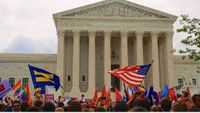Ten years after the U.S. Supreme Court’s landmark Obergefell v. Hodges decision legalized same-sex marriage nationwide, the issue has returned to the national spotlight—this time, propelled by a familiar figure. Kim Davis, the former Kentucky county clerk who became a symbol for religious freedom advocates and a lightning rod for LGBTQ+ rights supporters, has filed a fresh petition with the Supreme Court, asking it to overturn Obergefell and reconsider the constitutional protections underpinning marriage equality.
Davis’s latest legal maneuver, officially docketed as Davis v. Ermold on August 1, 2025, comes after a decade of litigation that began when she refused to issue a marriage license to David Ermold and David Moore, a gay couple, just days after Obergefell was decided in 2015. Her refusal, rooted in her religious beliefs, led to her brief jailing and a subsequent federal jury verdict in 2023 that awarded Ermold and Moore $100,000 in damages for emotional distress. Davis is also appealing $260,000 in attorney’s fees related to the case, according to The Well News.
The stakes of Davis’s petition go beyond her personal liability. She poses three key questions to the court: whether the First Amendment’s free exercise clause shields her from paying damages, whether Rowan County (her former employer) should bear the financial burden, and—most consequentially—whether Obergefell and the legal doctrine of substantive due process should be overturned. The latter question directly challenges the foundation of the 2015 marriage equality ruling, echoing arguments that the Supreme Court "went astray" and that its decision was "egregiously wrong" and "deeply damaging," as her attorneys put it.
Davis’s legal team has strategically tied their arguments to the Supreme Court’s 2022 decision in Dobbs v. Jackson Women’s Health Organization, which overturned Roe v. Wade and ended federal constitutional protections for abortion. In their petition, they cite Dobbs as proof that the Court is willing to reverse precedent when it deems previous constitutional interpretations incorrect. "As the court noted in Dobbs ... 'stare decisis is not an inexorable command' and 'is at its weakest when we interpret the Constitution,'" the petition reads. They argue that, just as the Court reversed itself on abortion, it should do the same with same-sex marriage.
This strategy is not lost on observers. As the Los Angeles Times notes, Davis’s petition is seen as part of a broader movement among some conservative activists and religious groups, such as the Southern Baptist Convention, to roll back court rulings and laws that, in their view, "defy God’s design for marriage and family." Others, including certain state lawmakers, have voiced concerns about religious conscience objections and the need to "preserve and grow our human race." Davis herself, in her original refusal, famously told the couple that she could not issue the license "under God’s authority," and when challenged about issuing licenses to other offenders, she replied, "that was fine because they were straight."
Despite the fervor of Davis and her supporters, most legal experts and advocates are skeptical that the Supreme Court will take up the case, let alone use it as a vehicle to overturn Obergefell. Jenny Pizer, Senior Counsel at Lambda Legal and a veteran of marriage equality litigation, told Keen News Service, "It’s hard to say for sure what will happen, but for now, I’m not staying up all night with anxiety that our marriages will be dissolved and we’ll not be able to marry in future." Pizer points to two reasons for her cautious optimism: first, the passage of the Respect for Marriage Act in 2022, which requires all states to recognize same-sex and interracial marriages performed legally elsewhere; and second, the lack of a clear majority on the Court to overturn Obergefell.
Indeed, while Justices Clarence Thomas and Samuel Alito have repeatedly signaled their desire to revisit and potentially overturn Obergefell, they would need to persuade at least two other justices to agree to even hear the case. The Supreme Court’s current conservative majority has, in the past, declined to engage directly with similar petitions. In 2020, for example, the Court rejected a previous request from Davis, with Thomas noting that her case did not "cleanly present" the legal questions necessary for reconsidering Obergefell.
Still, the petition’s timing and framing have reignited debates about the stability of rights based on substantive due process, the legal doctrine underpinning not only marriage equality but also other landmark decisions regarding contraception, parental rights, and sexual privacy. Davis’s attorneys argue that substantive due process is a "legal fiction," and her petition explicitly asks the justices to correct what they call a "mistake" in Obergefell. This approach mirrors the reasoning in Dobbs, where the Court found that abortion rights were not "deeply rooted in the Nation’s history and tradition." Davis and her allies now urge the Court to apply similar logic to same-sex marriage.
However, the Dobbs majority opinion, authored by Justice Alito, took pains to distinguish abortion from other rights, stating, "To ensure that our decision is not misunderstood or mischaracterized, we emphasize that our decision concerns the constitutional right to abortion and no other right." Justice Brett Kavanaugh, in a concurring opinion, was even more explicit, writing that Dobbs "does not threaten or cast doubt on" precedents like Obergefell.
Public opinion appears to be firmly on the side of marriage equality. According to a recent Gallup poll cited by the Los Angeles Times, 68% of Americans support same-sex marriage as of 2025. This broad acceptance has been mirrored in the rapid growth of same-sex marriages: the Williams Institute at UCLA estimates there are now 823,000 married same-sex couples in the U.S., with 591,000 marrying after Obergefell.
If the Supreme Court were to grant Davis’s petition and ultimately overturn Obergefell, the immediate practical effect would be limited by the Respect for Marriage Act. States would no longer be required to issue marriage licenses to same-sex couples, but they would still have to recognize marriages performed in other states. Nonetheless, such a ruling would represent a seismic shift in the legal landscape and could embolden efforts to challenge other substantive due process rights.
The Supreme Court is scheduled to consider Davis’s petition in a private conference on September 29, 2025. An attorney for Ermold and Moore has requested an extension until October 8 to file a response. As of press time, the Court has not responded to that request. Given the Court’s packed docket and its historical reluctance to revisit Obergefell, most observers expect the petition to be denied. If so, the lower court’s ruling—and the Obergefell precedent—will remain intact.
For now, the anniversary of Obergefell is marked by both celebration and vigilance. While life has gone on for hundreds of thousands of same-sex couples, the ongoing legal and political battles serve as a reminder that rights, once won, require constant defense. Whether Davis’s case becomes a historical footnote or a flashpoint for change, it has already reignited a national conversation about the meaning of liberty, equality, and the enduring struggle for justice.






